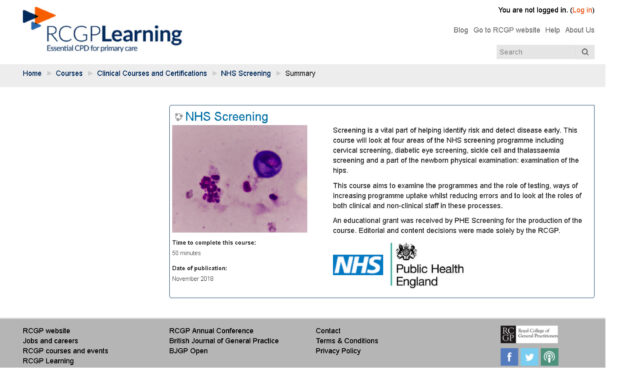Screening is a vital part of helping identify risk and detecting disease early. It is a way of finding out if people are at higher risk of a health problem, so that information can be given to help them make informed decisions about treatment options.
The Royal College of GPs (RCGP) has published new e-learning content, in conjunction with PHE Screening, that gives my GP and primary care colleagues practical guidance to support patients in understanding and accessing NHS screening programmes.

The 3 punchy 15-minute modules and one 5-minute podcast cover cervical screening, diabetic eye screening, sickle cell and thalassaemia screening and one part of the newborn and infant physical examination: the examination of the hips. The e-learning is available to all healthcare professionals, including the RCGP’s 59,000 GP members.
Not only is e-learning the most effective and efficient method of getting screening information across to primary care, it also contributes to GPs’ revalidation and continuing professional development (CPD).
Cervical screening module
Cervical screening is a method of detecting abnormalities of the cervix before they become malignant. It aims to reduce the number of cases of cervical cancer as a result. It is not a diagnostic tool.
The NHS Cervical Screening Programme aims to reduce the incidence of invasive cervical cancer and reduce mortality rates. PHE estimates that cervical screening in the UK saves up to 5,000 lives a year.
The new cervical screening module covers topics including:
- who should be screened?
- how frequently should cervical screening occur?
- the role of HPV in cervical cancer
- the role of HPV-triage in cervical screening
Diabetic eye screening module
Diabetic retinopathy is one of the most common causes of sight loss in people of working age. The NHS Diabetic Eye Screening Programme aims to detect the condition before changes in vision occur.
The diabetic eye screening module covers topics including:
- who is screened, including specific scenarios such as screening in pregnancy
- a review of the diabetic eye screening pathway
- an explanation of the grading system used for diabetic eye screening results
Sickle cell and thalassaemia screening module
The NHS Sickle Cell and Thalassaemia (SCT) Screening Programme aims to support people to make informed choices during pregnancy and before conception. It also works to improve infant health through prompt identification of affected babies via newborn blood spot testing.
The SCT screening module covers topics including:
- an explanation of the significance of sickle cell and thalassaemia in pregnancy
- the role of GPs in prenatal screening and diagnosis
- the role of GPs in the management of affected children
Hip examination podcast
The NHS Newborn and Infant Physical Examination (NIPE) Programme aims to identify and refer all children born with detectable congenital abnormalities within 72 hours of birth, and to further identify abnormalities that may become detectable by 6 to 8 weeks of age.
The new RCGP 5-minute NIPE podcast focuses on the hip examination, including topics such as ‘clicky hips’.
New GOV.UK guidance to support GPs
My fellow GPs and primary care colleagues can now also refer to the PHE Screening guidance for GPs and practice staff for more information on how to support patients in accessing screening and obtaining screening results.
This new guidance aims to answer some of the most common queries that come into the PHE Screening helpdesk from primary care, including:
- chasing up screening results
- making and changing screening appointments
- opting out of screening
PHE Screening blogs
PHE Screening blogs provide up to date news from all NHS screening programmes. You can register to receive updates direct to your inbox, so there’s no need to keep checking for new blogs.
5 comments
Comment by Tim Buck posted on
Thanks. Is this free to all GPs or only paid members of the RCGP?
Comment by Andrew Anderson posted on
Hi Tim
The resource is free until November for anyone in the UK that registers with an RCGP e-learning account. For non-UK residents, the cost is £55.
Many thanks
Comment by Jacqueline McDevitt posted on
Great, thanks for the prompt response and clarification.
Jacqueline
Comment by Jacqueline McDevitt posted on
Hi, this is very helpful thanks. Are there any plans to extend this to breast, bowel and AAA screening?
Comment by Lindsay Kimm posted on
Thank you for getting in touch about the new RCGP screening e-resources for the AAA, DES, SCT and NIPE programmes. I am delighted you found them useful.
We are now undertaking a 6-month 'measures of impact' project. Once this is completed the project outcomes will be presented to our senior management and they will be in a position to make an informed decision regarding the development of any further RCGP screening resources.